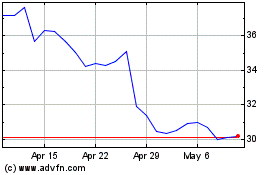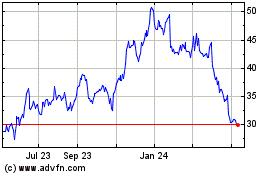By Austen Hufford and Aisha Al-Muslim
Intel Corp. Chief Executive Brian Krzanich resigned after the
company determined he violated company policy by having a past,
consensual relationship with an Intel employee.
The company said that a continuing investigation by internal and
external counsel confirmed a violation of Intel's
non-fraternization policy, which applies to all managers.
Intel said it accepted Mr. Krzanich's resignation on Wednesday.
The company said it expects all employees to respect Intel's values
and adhere to its code of conduct. Mr. Krzanich couldn't be reached
for comment.
Intel has a longstanding, non-fraternization policy that
prohibits managers from having sexual or romantic relationships
with employees who report directly or indirectly to them, a
spokesman for the company said. The spokesman called the policy a
"strict" and "hard ban" that he said applies to all managers
regardless of seniority level. The policy also requires that
employees who see or believe someone acted inappropriately to raise
their concerns immediately, he said.
The board said Chief Financial Officer Robert Swan would become
interim CEO, effective immediately. Mr. Swan joined Intel in 2016
after being CFO of eBay Inc. Intel has started a search for a
permanent leader and is considering internal and external
candidates.
Intel's shares fell 2% to $52.50 in late-morning trading in New
York. Along with the CEO news, the chip maker provided a
better-than-expected financial outlook for the current quarter.
Mr. Krzanich's sudden exit follows a string of high-level
departures at the company.
Diane Bryant, former head of Intel's data-center group, joined
Google's cloud business late last year. Stacy Smith, Intel's
onetime finance chief who later headed up manufacturing, also left
last year after three decades with the company. Kirk Skaugen,
former head of client computing who was at one point seen as a CEO
candidate, left the company in 2016 and is now with Lenovo Group.
Renee James, Intel's former president, left in 2015.
"We fail to see a clear internal long-term successor given
recent changes to senior management namely," analysts at Cowen
& Co. said in a research note Thursday. "However, given so much
change driven by Mr. Krzanich, his departure could make succession
planning and further transition challenging."
While details of the relationship weren't disclosed Thursday,
the public resignation highlights the discussions happening in
workplaces around the country over how employers should regulate
office romances.
Dating policies at U.S. companies vary. Some employers don't
allow senior managers to have relationships with co-workers, even
if they are not direct reports. The idea is that even if a manager
doesn't directly oversee an employee, they may have more power
within the organization. Other companies have no issue with
consensual relationships but have asked for them to be disclosed.
Still others have no dating policy at all.
Some companies have been revamping their rules around workplace
relationships in the wake of the #MeToo movement. Intel, like many
other technology companies, has said it was working to increase
gender and racial diversity in its workplace. In its 2017 diversity
report, the company said 73.5% of its total workforce was male.
Mr. Krzanich joins other CEOs who left following allegations of
relationships with employees, including Harry Stonecipher, who left
as CEO of Boeing Co. in 2005; Steven Heyer, who left Starwood
Hotels & Resorts Worldwide Inc. in 2007; and Christopher
Kubasik, who was the CEO-in-waiting when he left Lockheed Martin in
2012.
Mr. Krzanich started at Intel in 1982, rising through a series
of technical and leadership roles to become chief executive in
2013. He set about a broad effort to diversify the company's
offerings beyond its stronghold in processor chips for personal
computers, a market in which Intel holds a more than 90% share,
according to Mercury Research, leaving it scant room to grow as PC
shipments decline.
Intel's strength in processing chips has come under pressure as
graphics processors, primarily from Nvidia Corp., emerged as a
workhorse for artificial intelligence. Intel in 2016 sought to
address that market by buying Nervana Systems and Movidius, a pair
of startups working on AI-focused chips. It recently launched an
effort to make graphics chips to better compete with Nvidia.
Intel became more acquisitive under Mr. Krzanich. He built out
Intel's business in data-center servers, supplying companies such
as Amazon.com Inc. and Microsoft Corp. that are spending billions
annually on cloud-computing facilities. A big chunk of that growth
came from Intel's $16.7 billion deal for Altera Corp. in 2015 --
the company's biggest-ever acquisition.
Mr. Krzanich followed up his Altera buy with a big bet on the
booming market for automotive-vehicle technology by spending $15.3
billion for Mobileye NV, a leader in sensors for assisted-driving
features.
Mr. Krzanich also sought growth in others areas, beefing up
Intel's position in outfitting a variety of household and
industrial equipment with computing capabilities, a burgeoning
business known as the Internet of Things. Intel also has made a
push in the market for cellular-communications chips, replacing
Qualcomm Inc. units in a portion of Apple Inc.'s iPhones, and has
made inroads on 5G cellular technology.
Mr. Krzanich also pushed Intel into visibly high-profile areas
such as augmented-reality headsets and competitive gaming known as
esports. Some of these efforts fell short; Intel, for instance,
shut down several products designed for wearable computing, such as
smartwatches.
In recent months, Mr. Krzanich has emerged as a leading
proponent of the commercial drone industry, primarily by publicly
championing the company's technology and serving as chairman of a
high-level federal aviation advisory committee.
Since being named CEO, Intel's share price has risen 123%,
outpacing the S&P 500 but underperforming the PHLX
Semiconductor Sector Index. Sales have grown nearly 18% between
2012 and 2018 to $62.76 billion. Last year, Intel held a 99% share
of the most popular type of chips used in servers, and a 91% share
of the processors found in PCs, according to Mercury Research.
The company also released a financial forecast that was above
analyst expectations. For the current second quarter, the company
expected adjusted earnings of 99 cents a share and revenue of $16.9
billion. Analysts polled by FactSet had expected adjusted earnings
of 86 cents a share and revenue of $16.3 billion.
--Ted Greenwald, Tripp Mickle and Andy Pasztor contributed to
this article.
Write to Austen Hufford at austen.hufford@wsj.com and Aisha
Al-Muslim at aisha.al-muslim@wsj.com
(END) Dow Jones Newswires
June 21, 2018 13:14 ET (17:14 GMT)
Copyright (c) 2018 Dow Jones & Company, Inc.
Intel (NASDAQ:INTC)
Historical Stock Chart
From Mar 2024 to Apr 2024

Intel (NASDAQ:INTC)
Historical Stock Chart
From Apr 2023 to Apr 2024
